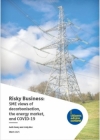-
Publication date:October 2021
In May 2019, The Scottish Government committed to establishing an independent Energy Consumers Commission (ECC) to enhance the voice of consumers who reside in Scotland within the energy market. The Commission was formed in July 2020 consisting of representatives with a wealth of experience in national consumer advocacy and advice bodies, academia and local groups serving energy consumers in their communities.
Eradicating fuel poverty has been a policy priority for the Scottish Government since 2016, and has been a statutory obligation since the passage of the Fuel Poverty (Targets, Definition and Strategy) (Scotland) Act in 2019. While fuel poverty has been formally defined since 2019, and a fuel poverty strategy is expected in 2021, fuel debt has not been given the same attention by researchers and policy makers.
Fuel debt is likely to become more prevalent and more unmanageable this winter as energy prices rise, and financial support such as the £20/week Universal Credit uplift and furlough end. This briefing, based on research commissioned from Changeworks, examines how fuel debt differs from fuel poverty, what key issues exist in Scotland, and the Commission’s recommendations on how to address rising levels of fuel debt.
Spotlight: -
Publication date:August 2021
The Warm Home Discount scheme provides important funding for the short-term relief of fuel poverty. However, a combination of research and evidence from the Citizens Advice network in Scotland has previously found that while the Warm Home Discount is seen as vital by those who receive it, it is not adequately reaching those who need it most. This consultation proposes a number of potentially positive changes to the operation of the Warm Home Discount scheme, alongside a 4-year extension to March 2026.
Spotlight: -
Publication date:July 2021
The Energy Consumer Commission formed in July 2020. The Commission consists of representatives with a wealth of experience in national consumer advocacy, advice bodies, academia and local groups serving energy consumers in their communities. This consultation response to the Scottish Government’s draft Heat in Building Strategy was written by the Citizens Advice Scotland energy policy team, on behalf of the Energy Consumer Commission.
-
Publication date:May 2021
Scotland’s Citizens Advice network empowers people in every corner of Scotland through our local bureaux and national services by providing free, confidential, and independent advice. We use peoples’ real-life experiences to influence policy and drive positive change. We are on the side of people in Scotland who need help, and we change lives for the better.
Our 2021/22 Impact work plan outlines the areas where we will be working to secure changes on behalf of our network’s clients. It has been drawn together following extensive analysis of advice data and consultative workshops with representatives from the network to identify significant trends and areas of concern.
Spotlight: -
 Publication date:May 2021
Publication date:May 2021Small and Medium-sized Enterprises (SMEs) are the lifeblood of Scotland’s economy. What options do they have in the energy market? This paper is meant to provide a baseline for the SME engagement with the decarbonisation agenda and energy market, on which future research and engagement can be built.
-
Publication date:March 2021
Citizens Advice Scotland welcomes this consultation, which reflects the pace and scope of Scotland’s climate ambitions. We are pleased that the Scottish Government has proposed a principle-based, people-centred approach.
It is essential that the outcomes of this standard reflect the complex heating, cooling, and ventilation needs of Scotland’s housing stock, and widens accessibility to truly affordable, highly efficient housing for low income and fuel poor households. Developers should be encouraged to follow the best practices of community engagement and ethical business practice so that the full potential of the buildings covered by this standard is realised. To aid developers in making future proof decisions, clear, thorough, and accessible guidance should be issued alongside this standard.
-
Publication date:November 2020
CAS welcomes a one-year extension to the Warm Home Discount scheme to 2021/22. As a result of the time pressures for securing this extension, we recognise the limitations of the proposals outlined. To have a meaningful impact, future changes to the scheme design must be complimented by an increase to the spending envelope. CAS also welcomes a discussion around devolution and the recognition that fuel poverty targeting could potentially be done more effectively at a national level.
Spotlight: -
Publication date:November 2020Spotlight:
-
Publication date:November 2020
We work on the issues that matter to our network’s clients and our member CAB. Our focus is on delivering advocacy drawn from the experience and insights of the Scottish Citizens Advice network, which is rooted in communities across the country.
Spotlight: -
Publication date:October 2020
Complex metering arrangements are found in significant numbers across both the Scottish electricity network distribution licence areas. Our advocacy on behalf of consumers in Scotland with non-E7 restricted meters is informed by the evidence of our network, where consumer detriment and problems with market access are commonly reported. CAS strongly supports the extension of SLC22G, but our response makes further recommendations to Ofgem which we believe require consideration if the extended market intervention is to be effective.
Spotlight: -
 Publication date:September 2020
Publication date:September 2020In 2019, Citizens Advice Scotland (CAS) commissioned research to ascertain consumers’ views on and experiences of the gas and electricity distribution networks in Scotland, and their priorities for future distribution network investment. We also explored the attitudes of consumers in Scotland towards some of the potential changes in electricity use that may be required as the energy system evolves to support Scottish and UK Government climate change targets, and consumers' understanding and opinions of some of the technologies that are envisaged to aid the energy transition. In addition, we explored consumers’ views on a potential increase in the electrification of heat in Scotland, and their enthusiasm for and opinions of future opportunities to provide flexibility to their electricity distribution network operator.
This report summarises the results of our research and considers how Scotland’s gas and electricity distribution networks might be able to help redefine consumers’ relationship with the energy system in support of Scottish and UK Government climate change policies. It is published alongside a summary of its key findings and the final report compiled by our research partner, Accent.
-
Creating a framework for robust consumer protection in the energy efficiency and renewable retrofit sectorPublication date:September 2020
-
 Publication date:August 2020
Publication date:August 2020Scotland has redefined fuel poverty and set targets towards its eradication by 2040. The Warm Home Discount scheme exists, by definition, to support fuel poor households and fuel poverty risk groups. This report examines the effectiveness of Warm Home Discount in the context of the new fuel poverty definition in Scotland.
'Mind the Fuel Poverty Gap' sets the policy context around the key issues, provides insight into research conducted by Changeworks for CAS, and makes a series of recommendations.
-
 Publication date:July 2020
Publication date:July 2020Scotland has set some of the most determined climate goals in the world, and home energy efficiency has a large role to play in Scotland’s transition to a low or no carbon society.
The Scottish Government has set ambitious goals for Scotland’s housing stock, which will be measured by a home’s energy efficiency rating as described in an energy performance certificate (EPC). However, consumer knowledge of EPCs is low, and even though they contain recommendations on how to make a home more energy efficient, they seem to be a poor motivational tool.
CAS commissioned Changeworks to gather feedback about how EPCs are viewed, understood, and interacted with by consumers, and how they could be improved to be better understood and more motivational.
Through a combination of ISM workshops and online testing, research found that:
-
Many people view energy efficiency as a luxury for those who can afford it
-
Barriers to home energy efficiency improvements are essentially cost and hassle
-
EPCs are not considered useful, and most homeowners just put them in a drawer
-
People who consider themselves highly environmentally conscious are no more likely to know their home energy efficiency rating or be familiar with an EPC than someone who is disengaged with environmental issues (value-intention gap)
-
People are mainly motivated by cost, but social desirability plays a large role as well. People may be more motivated by the cost of not acting than potential fuel bill savings, especially if this is linked to Scotland’s carbon targets or the climate emergency
-
A 1-2-3 style EPC, designed like a home report, may be easier for consumers to understand and engage with
-
Consumers value simplicity and colour, but for many the preferred style and layout was subjective. Energy efficiency advice accompanying an EPC is crucial to ensure consumers understand the document and are able to make the choices most suitable to their property
-
-
Scottish Commission on Social Security consultationPublication date:June 2020
Citizens Advice Scotland welcomes the moves to extend Winter Heating Assistance in the challenging context of COVID19 which has resulted in delays to wider measures on disability assistance. We recommend the draft regulations are amended to better meet the policy intention and add clarity in a number of areas.
Spotlight: -
Publication date:June 2020
Citizens Advice Scotland welcomes the opportunity to respond to this consultation. Above all, we want to ensure that a market framework improves outcomes for heat network consumers. We have been calling for heat network consumers to have access to the same rights and services afforded to customers of the regulated energy market for several years.
-
Publication date:May 2020
CAS welcomes the opportunity to respond to this consultation.
We want to ensure that the Heat Networks (Scotland) Bill delivers the best possible outcomes for heat network consumers, and gives parity with the rights and services afforded to consumers of the regulated energy market. Unfortunately we are aware of instances where heat network consumers have been disadvantaged due to the current unregulated nature of heat networks and are keen that this Bill works towards improving this as much as possible.
-
Publication date:April 2020
CAS welcomes the ambition of the Scottish Government to bring every owner-occupied home in Scotland to Energy Performance Certificate (EPC) band C. This will not only increase the energy efficiency of Scotland’s housing stock, but also reduce carbon emissions and alleviate fuel poverty. We believe a warm, dry, energy efficient home that is affordable to heat should be the standard in Scotland, not a privilege.
-
Publication date:February 2020
Fairer pricing, clear and accurate billing and better support for people in vulnerable situations are at the heart of Citizen Advice Scotland’s (CAS) priorities for the energy market in Scotland which are summarised in this report.
With the retail market facing potential changes in the coming years, with OVO energy’s recent takeover of SSE retail energy business, as well as the Scottish Government’s proposal for a Public Energy Company, the charity has published a report on priorities for customers.
This report draws upon evidence and insights from our frontline advisers in Citizens Advice Bureaux (CABs) across Scotland and the Extra Help Unit (EHU). It highlights cases from our CABs in six thematic areas which are crucial to consumers.
CAS six key consumer priorities are:
- Fair pricing and debt support; so customers aren't shocked by sudden increases in costs and the ability to pay is central to any debt repayment scheme.
- Ease of contact; so customers aren’t left in the dark or hanging on the phone about their service or bills
- Clear and accurate billing; to allow customers to understand how charges have been calculated, and to stop people accruing debt through no fault of their own
- Easy access to the Warm Home Discount; to help more people with the cost of energy
- Better support for vulnerable consumers; particularly accurate meter reads to prevent bill shocks
- Offering choice for consumers on restricted electricity meters; to challenge fuel poverty for consumers off the gas grid
The report also summarises a review undertaken for CAS around consumer engagement in the energy market in Scotland and makes a number of recommendations on how fuel poor households may be supported. This review is available on request.
Spotlight: -
 Publication date:February 2020
Publication date:February 2020CAS is publishing its Market Pulse report which has tracked the attitudes of consumers in Scotland over three years on a range of issues, finding
- 12 per cent of consumers rating their bills as unaffordable
- A fall in consumers using the traditional Big Six suppliers with consumers moving to smaller suppliers, often because of lower prices
- A decrease in people using electricity to heat their homes and an increase in people using gas, laying out the challenges in the energy market as policy makers move to decarbonise heat and meet climate emissions targets
- Almost half of consumers could qualify for extra support through the Priority Service Register – but only a quarter of consumers are actually enrolled.
The report is available for download below. The data is also available on request.
Spotlight:
Stressed About Debt? High costs of energy, food and fuel mean that many people are finding it impossible to keep up, worrying about debt or falling behind on bills. The Citizens Advice network in Scotland is here for you, with free, confidential and impartial advice in a variety of ways.